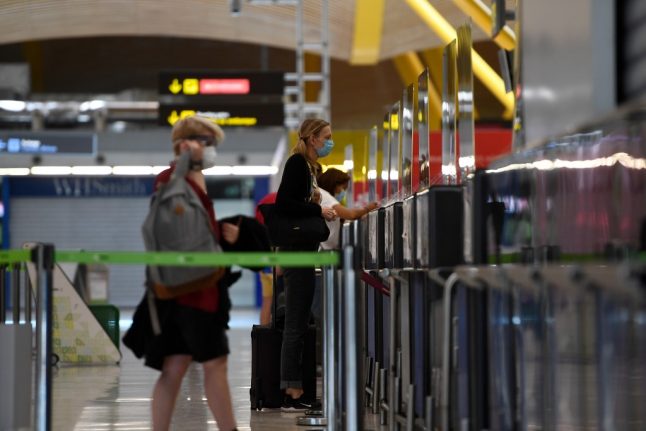The EU on Thursday published its revised list of 'safe' countries which it recommends members allow travellers to enter from – but the USA is still not on it.
Europe began to open up its external borders on July 1st (after opening up travel within Europe from June 15th) and at that time the EU said that the list of 'safe' countries would be revised every two weeks.
The first revised list has now been published, and no new countries have been added but Serbia and Montenegro have been removed from the list.
The list will be revised again in another two weeks.
So what does this mean for Americans?
Firstly, the travel rules are based around where you are coming from, not what passport you hold. So a US citizen travelling from Germany, for example, would be permitted to enter Spain because there are no travel between Germany and Spain.
READ ALSO: Everything visitors to Spain need to know about its Covid-19 travel rules

Secondly, this does not affect US citizens who are permanent residents of Spain or other EU countries, although they will need to show proof of residency at the border.
Essential travel has been permitted throughout the lockdown and this continues, although the definition of essential travel into the EU is stricter than many countries' individual rules and does not include a category for family emergencies (more detail below).
So this latest ruling really affects tourists, second home owners and those wishing to visit family and friends in Spain.
This will now stay in place until at least July 30th.
Is it a final ruling?
The EU's list is advisory and member states are free to impose different rules if they want (as for example Italy has done) so in theory Spain could decide to allow in visitors from the US anyway.
There's another list due at the beginning of August but the list is largely based on the health situation in individual countries, so how quickly the ban on American tourists is lifted really depends on the evolution of the coronavirus epidemic in the US.
Countries were included on the safe list if the coronavirus outbreak in the country was judged to be the same or better than that EU average. The bar was fixed at 16 cases per 100,000 people over the last two weeks.
The revised list of 'safe' countries is: Algeria, Australia, Canada, Georgia, Japan, Morocco, New Zealand, Rwanda, South Korea, Thailand, Tunisia and Uruguay. China is also provisionally on the list, if reciprocity requirements are met.
Who can travel from the US to Spain?
The European council' statement says: “For countries where travel restrictions continue to apply, the following categories of people should be exempted from the restrictions:
- EU citizens and their family members
- long-term EU residents and their family members
- travellers with an essential function or need, as listed in the recommendation.
In the European council's recommendation these are the “Specific categories of travellers with an essential function or need”:
- Healthcare professionals, health researchers, and elderly care professionals; Frontier workers;
- Seasonal workers in agriculture;
- Transport personnel;
- Diplomats, staff of international organisations and people invited by international organisations whose physical presence is required for the well-functioning of these organisations, military personnel and humanitarian aid workers and civil protection personnel in the exercise of their functions;
- Passengers in transit;
- Passengers travelling for imperative family reasons;
- Seafarers
- Persons in need of international protection or for other humanitarian reasons
- Third-country nationals travelling for the purpose of study;
- Highly qualified third-country workers if their employment is necessary from an economic perspective and the work cannot be postponed or performed abroad.
It's important to remember however that travellers will ultimately have to convince border guards that they meet one of the above categories.



 Please whitelist us to continue reading.
Please whitelist us to continue reading.
Member comments